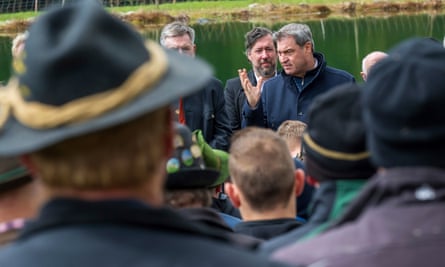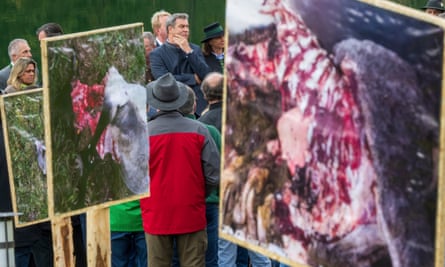Data and information from the Bundesamt für Naturschutz BfN
Current wolf numbers: 184 packs, 47 wolf pairs and 22 sexies
The wolf does not belong here’: German summit convened after animal attacks
Farmers express concern for their livelihoods after series of deadly attacks on farm animals
German farmers, conservationists and politicians have met at a wolf summit to discuss the animal’s future amid concerns that its population is out of control.
The farmers’ union is calling for a relaxation of rules over when wolves, strictly protected under EU law, can be shot, after a series of highly publicised deadly attacks on farm animals.
It has said that people in rural areas are fearful for their lives as well as the lives of their animals, with many farmers expressing concern for their livelihoods.
Germany is home to an estimated 161 packs of wolves (of between eight to 12 animals each) according to the Federal Wolf Documentation and Advisory Office. A further 43 pairs and 21 individual animals were also registered.

Numbers have increased year on year since the wolf was placed under species protection in 1990, after it was considered to have more or less become extinct at the end of the 19th century.
The southern state of Bavaria has already taken its own decision to allow farmers to actively kill wolves where livestock is thought to be under particular threat.
Its leader, Markus Söder, visited an alpine village on Thursday that has reportedly been the scene of attacks on grazing animals, where he said the future of farming was in danger if wolf populations were not brought under control.
“I’ll say it quite clearly, the wolf does not belong here,” Söder told a gathering of farmers and their families in Oberaudorf. “We have introduced a new wolf bylaw … one breach is sufficient and the wolf can be removed from a region.”

His Christian Social Union (CSU) has said it would like to see the elimination of all wolves from Germany. Its larger sister party, the centre-right CDU, has called for hunting rights to be expanded to include wolves.
Harald Ebner, of the Greens party, head of the federal committee for environment and nature protection, said it would be wrong for such permission to be granted. “The quick call to arms is no solution and the perpetual appeal for wolf-free zones and quotas contravenes EU law and will bring no relief to keepers of grazing animals,” he said.
The environment minister, Steffi Lemke, also of the Greens, has argued for increasing protection both for grazing animals and wolves. “We cannot in good conscience, call for the protection of animals in African countries at the same time as saying here that it is not possible to protect the wolf,” she said
The farmers’ union in Brandenburg, northern Germany, home to the largest number of wolves in the country with an estimated 47 packs and 14 pairs, is calling for a quota that could be shot legally each year, drawing on wolf population control measures in Finland and Sweden.
Brandenburg permitted wolves to be shot in specifically defined cases in 2022, after a series of livestock killings. A male wolf was killed in March after 76 livestock deaths were attributed to it.
Can wolves and livestock coexist in Germany?
Agriculture Minister Julia Klöckner chose a sheep farm in rural Brandenburg, a 90-minute drive from Berlin's government district, to announce the launch of Germany's new federal center for livestock and wolves.
"Just as the wolf is entitled to protection, so are our livestock," Klöckner said. "We need them to maintain and preserve our cultural landscape." The return of the wolf, she said, should not "lead to the existence of livestock being threatened in some regions of Germany."
Klöckner made an appearance at the new center for livestock and wolvesImage: Felix Zahn/photothek.ne
Wolves and bears were extinct in Germany for about 100 years, so livestock hadn't required special protection. But that all changed around the turn of the millennium.
That's when wolves were once more spotted in Germany, having migrated from Poland. Today, their populations are concentrated along the Elbe river in northern and eastern Germany.
These wolves do not just eat deer in the forest, but also sheep, goats and cattle from farms. This has been a sore point for farmers for years, especially those who keep their animals on open pastures.
The minister provided some figures: There were 40 animals injured or killed by wolves in 2006, but by 2019 the number had grown to 2,900. This mostly has to do with the increased population, Klöckner said.
"Every three to four years, the wolf population doubles," she said. She added that the wolf population could be controlled — through targeted shooting. Although the exact number of wolves in Germany is not known exactly, it's estimated there are 1,300 to 1,800 individual animals roaming free.
Seeking solutions
The sheep in the pasture Klöckner visited belong to Carina Vogel. She comes from the region and believes that it is possible to reconcile the different interests.
"As a natural conservation sheep farm, we believe that ecological, animal-friendly farm management is possible even under conditions made difficult by the presence of wolves!" she wrote on her website. Fences and dogs are key, she added.
This is the basis of a new federal initiative.
"We are creating a platform that develops practical solutions — including information on costs and funding opportunities," said Hanns-Christoph Eiden, from the federal office for agriculture and food. It will be based around "networking and dialogue, knowledge transfer and the identification of research needs."
The state of Brandenburg is currently home to the most wolves in Germany. They are monitored via a state-owned wolf management system. As of 2020, it is believed there are 47 packs plus 10 pairs in Brandenburg.

Seeking
Brandenburg a dispute hotspot
And Brandenburg has also been at the heart of anti-wolf protests for years. Since 2017, "Nights of the Wolf Watches" have been taking place in Brandenburg communities. Farmers and hunters gather to protest the spread of the wolf, drawing attention to themselves with "warning shots." They say the government is not doing enough to protect livestock against wolf attacks.
Recently, the organizers' message has spread to other parts of Germany, in an association that calls itself the "free farmers."
"We have 480 members in Brandenburg and 1,250 members nationwide," media officer Reinhard Jung told DW. What Klöckner is doing "doesn't interest anyone in the countryside," Jung said.
"People are disappointed," Jung added. Wolves have led farmers, especially cattle farmers, to quit.
"They can't stand seeing the dead animals lying in the pasture over and over again," Jung said.
And what about protective fences? Such high-tech 1.2-meter (4-foot) constructions don't work to prevent wolves from getting in, opponents say. "It makes no sense," Jung said.
Political conflict has increased in Brandenburg's state parliament. In fall 2020, the state farmers' association had terminated its cooperation with the state government — due to differing views on wolf management. At the end of January, the Brandenburg state parliament voted to make it easier to shoot so-called problem wolves.
There is also the "Wolf Free Zone" initiative, which 52 cities and towns in Brandenburg have joined.
For many other parts of Germany, the issue is still relatively new, as the wolf is slow to migrate westward. But with the wolf population increasing, this may well be an issue that all of Germany has to face before too long.
This article has been translated from German.
Well worth visiting the DW site for videos on the subject of wolves
https://www.dw.com/en/wolves-and-livestock-can-they-live-in-harmony-in-germany/a-57097331
Another DW report (from 2020) worth reading is: Wolves Are Protected even in Towns Top EU Court Rules https://www.dw.com/en/wolves-are-protected-even-in-human-settlements-top-eu-court-rules/a-53778883
Sadly, politicians and "donators" will do their best to to bring back wolf hunting and they have powerful self indulgent politicians such as the President of the EU, Ursula von der Leyen, on their side.










No comments:
Post a Comment